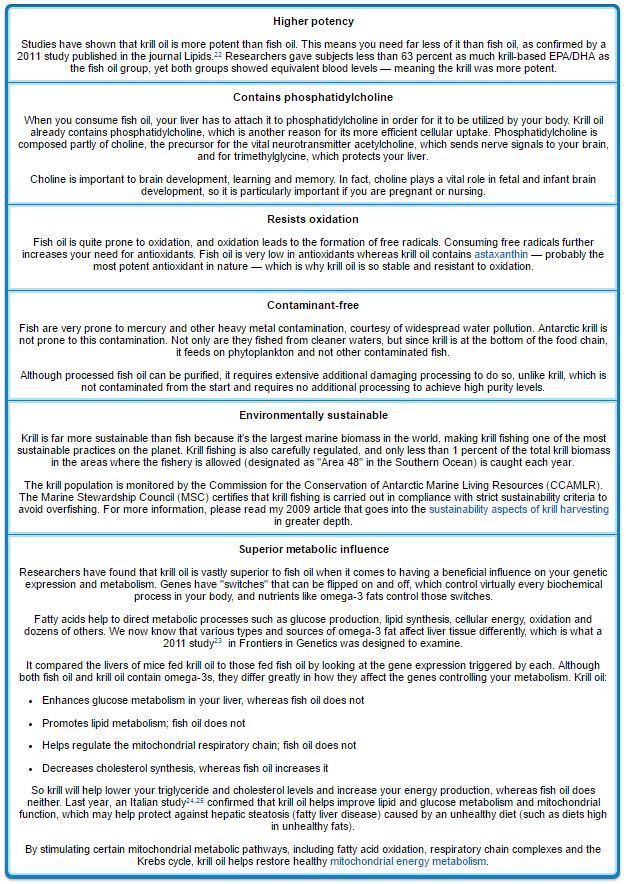Eat Good Fats
By Dr. Mercola
Omega-3 fats — specifically EPA and DHA — are essential to your overall health, including your heart health.
A recent analysis of 19 studies confirms that regular consumption of fish and other omega-3 rich foods, including certain plant-based sources, may lower your risk of a fatal heart attack (myocardial infarction) by about 10 percent.1,2,3
This effect held true even after accounting for confounding factors like age, sex, ethnicity, diabetes and use of aspirin or cholesterol-lowering drugs.
According to senior study author Dr. Dariush Mozaffarian, “Our results lend support to the importance of fish and omega-3 consumption as part of a healthy diet.” Other studies have found even more significant effects.
One large Italian trial found that heart attack survivors who took 1 gram of omega-3 fat each day for three years had a 50 percent reduced chance of sudden cardiac death.4
- Fish oil is bound to triglycerides and methyl esters
- Krill oil is bound to triglycerides and phospholipids
Phospholipids are also one of the principal compounds in high-density lipoproteins (HDL), which you want more of, and by allowing your cells to maintain structural integrity, phospholipids help your cells function properly. (You can learn more about this in the video above.)
There’s also a synthetic form of marine omega-3, which is bound to ethyl esters. This is simply a fatty acid that has been sliced off from its triglyceride source and then ethylated with ethanol. Pharmaceutical omega-3 supplements are typically made this way, and research shows ethyl esters, unless taken in conjunction with a meal, may simply pass through your body without being absorbed whatsoever.
Other Advantages of Krill Oil Over Fish Oil
Research also shows krill oil has a number of other advantages over fish oil, including the following:
Butter Is Not Linked to Heart Disease
Besides omega-3 fats, you might have heard some of the good news about saturated animal fats like butter and lard being far healthier than previously believed. Recent research has again acquitted butter, finding it does NOT increase your risk for heart disease.26 As reported by STAT:27
“Researchers combined the data from nine studies looking at the relationship of butter consumption with various health outcomes. They found that eating butter didn’t significantly change people’s incidence of cardiovascular disease, coronary heart disease or stroke.
The study did find a small link between butter and overall mortality — each daily tablespoon of butter was linked to a 1 percent increase in mortality risk. On the other hand, the same amount of butter was associated with a 4 percent lower risk of diabetes.”
Butter, as you probably know, has long been demonized for being high in saturated fat. But as butter consumption declined, being replaced instead by processed vegetable oils that were thought to be healthier for the heart, heart disease rates actually increased.
Today, we recognize that trans fats are far more harmful to your heart than saturated animal fats ever were, and butter is again gaining favor. An interesting article in The Atlantic28 dating back to 2012 describes the history behind the misguided advice to avoid saturated fats, and “how Procter & Gamble convinced people to forgo butter and lard for cheap, factory-made oils loaded with trans fat.”
Citizen Petition to Lift Interstate Ban on Raw Butter
In related news, the Farm-to-Consumer Defense Fund and Organic Pastures Dairy Company have organized a citizen’s petition to lift the interstate ban on raw butter. According to the Food and Drug Administration (FDA), it has the authority to ban the sale of raw butter under its power to regulate communicable disease — a claim Pete Kennedy, attorney for Farm-to-Consumer Defense Fund, says is “not only ridiculous but illegal as well.” As noted in a recent article announcing the petition:29
“FDA’s assertion of this power in banning raw butter is dubious for two reasons: first, the ban violates the Federal Food and Drug Cosmetic Act (FFDCA); and second, FDA is trying to prohibit a food in interstate commerce that has little or no record of making anyone sick.
FDA’s butter ban is illegal according to a statute in the FFDCA that governs standards of identity for food. Standards of identity are requirements prescribing what a food product must contain to be marketed under a certain name in interstate commerce.
For instance, the standard of identity for milk in final package form requires that it be pasteurized or ultrapasteurized and that it contain not less than 8 ¼ percent non-fat milk solids and not less than 3 ¼ percent milkfat. FDA’s long-held position is that the pasteurization requirement can be part of the standard of identity. Standards of identity are intended to promote honesty and fair dealing for the benefit of consumers.
Congress has given FDA power to issue regulations establishing standard of identity requirements for most foods, but there are exceptions and one of those is butter.
The FFDCA specifically prohibits FDA from establishing a standard of identity for butter; Congress has passed a law defining butter that serves as a standard of identity for the product. That definition does not require butter to be pasteurized. The petition asks FDA to obey the law and abide by the statutory standard of identity for butter.”
To help, I encourage you to make a donation to the Farm-to-Consumer Defense Fund. If you’re not already a member, you may also consider becoming one.
Sources and References
- 1 WebMD June 27, 2016
- 2 Medical News Today June 27, 2016
- 3 Biosciencetechnology.cm June 29, 2016
- 4 Lancet 1999; 354:447-55
- 5 Am J Gastroenterol. 2005 Dec;100(12):2674-80
- 6 BMC Musculoskelet Disord. 2010;11:136
- 7 Journal of the American College of Nutrition 2007 Feb;26(1):39-48
- 8 J Anim Physiol Anim Nutr (Berl). 2012 Apr;96(2):295-306
- 9 J Agric Food Chem. 2009 Oct 14;57(19):9339-45
- 10, 11 Alternative Medicine Review 2003 May;8(2):171-9
- 12 Alternative Medicine Review 2007 Sep;12(3):207-27
- 13 Lipids Health Dis. 2008 Aug 29;7(1):30
- 14 Urol Res. 2011 Feb;39(1):59-67
- 15, 20 Omega-3 Institute, Differentiation of ALA (plant sources) from DHA + EPA (marine sources) as Dietary Omega-3 Fatty Acids for Human Health
- 16 Alwaysomega3s.com, Fact: Not all omega-3s are created equal
- 17 SFH.com, EPA and DHA Explained
- 18 Harvard Nutrition Science, Omega-3s
- 19, 21 Authority Nutrition, DHA: A Detailed Review
- 22 Lipids January 2011
- 23 Frontiers in Genetics July 12, 2011
- 24 BioMed Research International 2015, Article ID 645984
- 25 Mitochondrial Disease News August 31, 2015
- 26 Time Magazine June 29, 2016
- 27 STAT June 29, 2016
- 28 The Atlantic April 26, 2012
- 29 Farm to Consumer Defense Fund June 23, 2016
The post Eat Good Fats appeared first on LewRockwell.


Leave a Reply